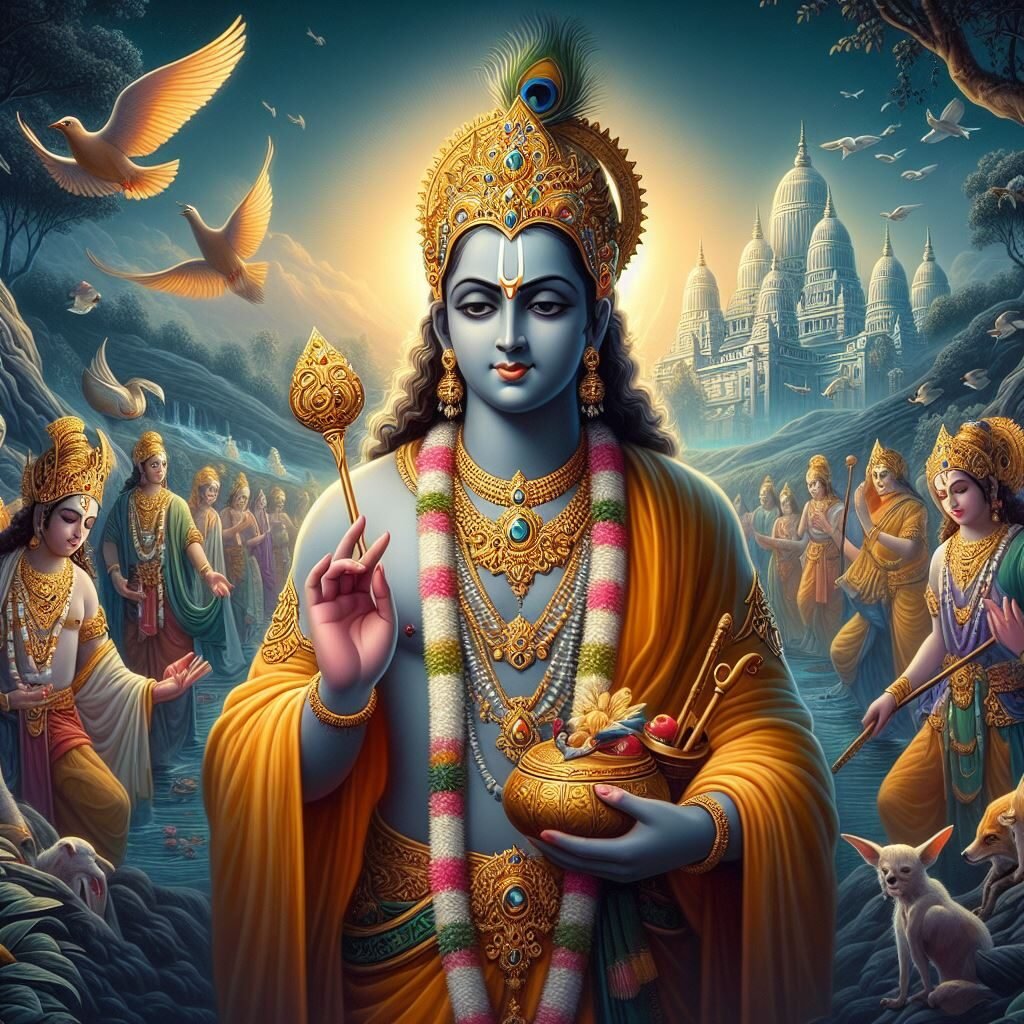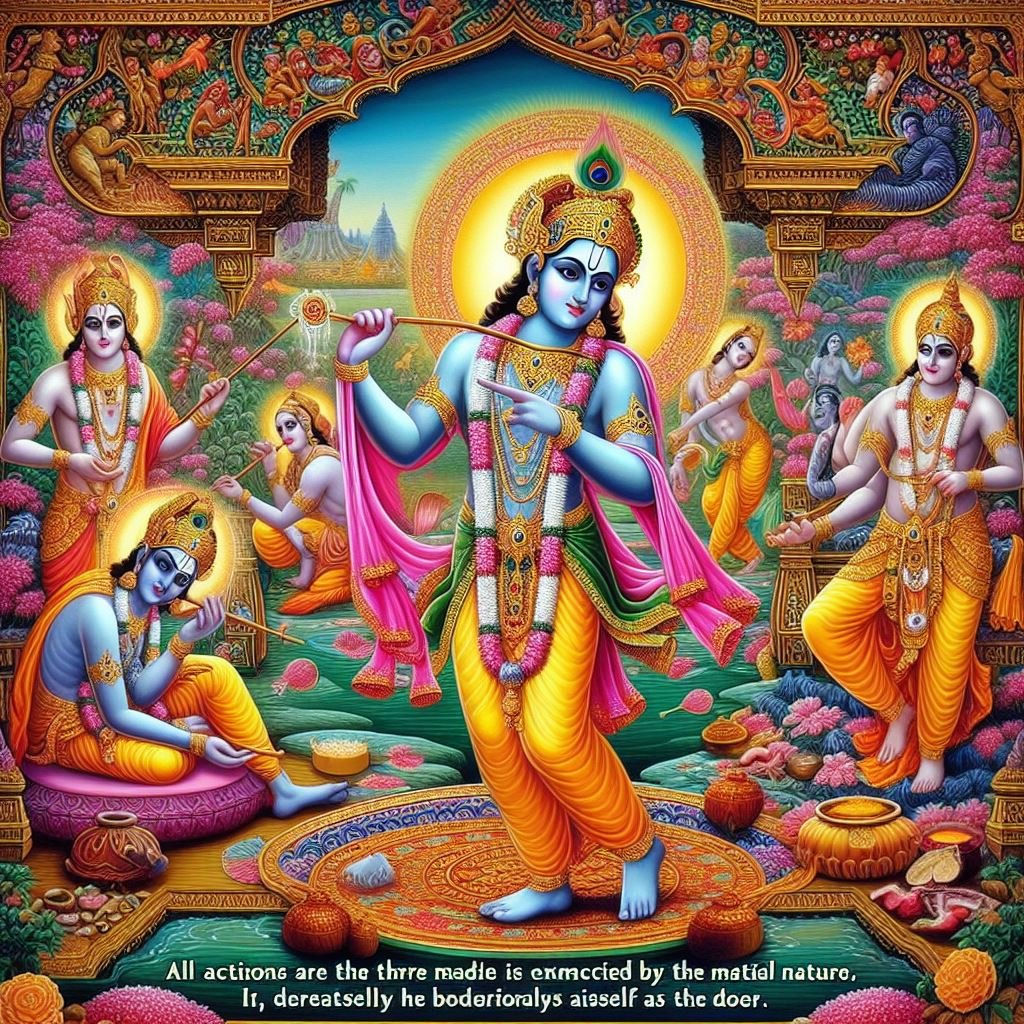All actions are executed by the three modes of material nature. However, in ignorance, the soul, misled by false identification with the body, erroneously perceives itself as the doer.
Description
We observe that the natural phenomena of the world unfold without our direct intervention, orchestrated by prakṛiti, or Mother Nature. Regarding the actions of our own body, we typically categorize them into two groups:
- Natural biological functions like digestion, blood circulation, and heartbeat, which occur spontaneously without conscious effort.
- Actions such as speaking, hearing, walking, sleeping, and working that we perceive ourselves as consciously initiating.
Both these types of actions are facilitated by the mind-body-senses mechanism, all of which are comprised of prakṛiti, or material energy, governed by the three modes—goodness (sattva), passion (rajas), and ignorance (tamas). Just as waves are inseparable from the ocean, our bodies are integral parts of Mother Nature from which they are fashioned. Hence, it is the material energy that is the ultimate executor of all activities.

So why does the soul perceive itself as the doer? This occurs due to the entanglement of the ego, as the soul mistakenly identifies itself with the body. Consequently, it remains under the illusion of being the agent of actions. To illustrate, consider two trains parked side by side on a railway platform. If a passenger on one train fixates on the other, when the second train moves, it appears as though the first train is in motion. Similarly, the stationary soul identifies with the mobility of prakṛiti, thus erroneously assuming itself to be the doer. The moment the soul transcends the ego and surrenders to the divine will, it realizes its true nature as the non-doer.
One might question why the soul is held accountable for actions performed by the body if it is truly the non-doer. The explanation lies in the fact that while the soul itself does not physically carry out actions, it does guide the actions of the senses, mind, and intellect. Analogously, a chariot driver doesn’t physically propel the chariot but directs the horses. Consequently, if an accident occurs, it is the driver who is held responsible, not the horses. Similarly, the soul is accountable for the actions of the mind-body mechanism because the senses, mind, and intellect act upon receiving inspiration from the soul.

सभी क्रियाएं भौतिक प्रकृति के तीन गुणों द्वारा निष्पादित होती हैं। हालाँकि, अज्ञानता में, आत्मा, शरीर के साथ गलत पहचान से गुमराह होकर, गलती से खुद को कर्ता मान लेती है।
विवरण
हम देखते हैं कि दुनिया की प्राकृतिक घटनाएं हमारे सीधे हस्तक्षेप के बिना प्रकृति या मातृ प्रकृति द्वारा संचालित होती हैं। हमारे अपने शरीर की गतिविधियों के संबंध में, हम आम तौर पर उन्हें दो समूहों में वर्गीकृत करते हैं:
पाचन, रक्त परिसंचरण और दिल की धड़कन जैसी प्राकृतिक जैविक क्रियाएं, जो सचेत प्रयास के बिना स्वचालित रूप से होती हैं।
बोलने, सुनने, चलने, सोने और काम करने जैसी क्रियाएँ जिन्हें हम स्वयं सचेत रूप से आरंभ करने वाला मानते हैं।
इन दोनों प्रकार की क्रियाओं को मन-शरीर-इंद्रियों तंत्र द्वारा सुगम बनाया जाता है, जिनमें से सभी प्रकृति, या भौतिक ऊर्जा से युक्त होते हैं, जो तीन गुणों – अच्छाई (सत्व), जुनून (रजस), और अज्ञान (तमस) द्वारा नियंत्रित होते हैं। जिस प्रकार लहरें समुद्र से अविभाज्य हैं, उसी प्रकार हमारे शरीर प्रकृति माँ के अभिन्न अंग हैं जिससे उनका निर्माण हुआ है। इसलिए, यह भौतिक ऊर्जा ही है जो सभी गतिविधियों की अंतिम निष्पादक है।
तो आत्मा स्वयं को कर्ता क्यों मानती है? यह अहंकार के उलझाव के कारण होता है, क्योंकि आत्मा गलती से स्वयं को शरीर के साथ पहचान लेती है। फलस्वरूप वह कर्मों का कर्ता होने का भ्रम पाले रहता है। उदाहरण के लिए, एक रेलवे प्लेटफार्म पर अगल-बगल खड़ी दो ट्रेनों पर विचार करें। यदि एक ट्रेन का यात्री दूसरी ट्रेन पर ध्यान केंद्रित करता है, तो जब दूसरी ट्रेन चलती है, तो ऐसा प्रतीत होता है जैसे पहली ट्रेन गति में है। इसी प्रकार, स्थिर आत्मा प्रकृति की गतिशीलता से पहचान करती है, इस प्रकार गलती से स्वयं को कर्ता मान लेती है। जिस क्षण आत्मा अहंकार को पार करती है और ईश्वरीय इच्छा के प्रति समर्पण करती है, उसे अकर्ता के रूप में अपने वास्तविक स्वरूप का एहसास होता है।
कोई यह प्रश्न कर सकता है कि यदि आत्मा वास्तव में अकर्ता है तो शरीर द्वारा किए गए कार्यों के लिए आत्मा को जिम्मेदार क्यों ठहराया जाता है। व्याख्या इस तथ्य में निहित है कि यद्यपि आत्मा स्वयं शारीरिक रूप से कार्य नहीं करती है, वह इंद्रियों, मन और बुद्धि के कार्यों का मार्गदर्शन करती है। इसी प्रकार, एक रथ चालक शारीरिक रूप से रथ को नहीं चलाता बल्कि घोड़ों को निर्देशित करता है। नतीजतन, यदि कोई दुर्घटना होती है, तो इसके लिए चालक को जिम्मेदार ठहराया जाता है, न कि घोड़ों को। इसी प्रकार, आत्मा मन-शरीर तंत्र के कार्यों के लिए जवाबदेह है क्योंकि इंद्रियां, मन और बुद्धि आत्मा से प्रेरणा प्राप्त करने पर कार्य करते हैं।
ସମସ୍ତ କାର୍ଯ୍ୟଗୁଡ଼ିକ ବସ୍ତୁ ପ୍ରକୃତିର ତିନୋଟି ମୋଡ୍ ଦ୍ୱାରା ଏକଜେକ୍ୟୁଟ୍ ହୁଏ | ଅବଶ୍ୟ, ଅଜ୍ଞତାରେ, ଶରୀର ସହିତ ମିଥ୍ୟା ପରିଚୟ ଦ୍ୱାରା ବିଭ୍ରାନ୍ତ ହୋଇଥିବା ଆତ୍ମା ଭୁଲ୍ ଭାବରେ ନିଜକୁ କର୍ମକର୍ତ୍ତା ଭାବରେ ଅନୁଭବ କରେ |
ବର୍ଣ୍ଣନା
ଆମେ ଦେଖୁ ଯେ ବିଶ୍ direct ର ପ୍ରାକୃତିକ ଘଟଣାଗୁଡ଼ିକ ଆମର ପ୍ରତ୍ୟକ୍ଷ ହସ୍ତକ୍ଷେପ ବିନା ପ୍ରକାଶ, କିମ୍ବା ମାତା ପ୍ରକୃତି ଦ୍ୱାରା ସଂଗଠିତ | ଆମ ନିଜ ଶରୀରର କାର୍ଯ୍ୟ ବିଷୟରେ, ଆମେ ସାଧାରଣତ them ସେମାନଙ୍କୁ ଦୁଇଟି ଗୋଷ୍ଠୀରେ ବର୍ଗୀକୃତ କରିଥାଉ:
ହଜମ, ରକ୍ତ ସଞ୍ଚାଳନ, ଏବଂ ହୃଦସ୍ପନ୍ଦନ ପରି ପ୍ରାକୃତିକ ଜ bi ବିକ କାର୍ଯ୍ୟ, ଯାହା ଚେତନା ପ୍ରୟାସ ବିନା ସ୍ୱତ ane ପ୍ରବୃତ୍ତ ଭାବରେ ଘଟେ |
କଥାବାର୍ତ୍ତା, ଶୁଣିବା, ଚାଲିବା, ଶୋଇବା, ଏବଂ କାର୍ଯ୍ୟ କରିବା ଭଳି କାର୍ଯ୍ୟ ଯାହା ଆମେ ନିଜକୁ ସଚେତନ ଭାବରେ ଆରମ୍ଭ କରୁ ବୋଲି ଅନୁଭବ କରୁ |
ଉଭୟ ପ୍ରକାରର କାର୍ଯ୍ୟ ମନ-ଶରୀର-ଇନ୍ଦ୍ରିୟ ଯନ୍ତ୍ରକ by ଶଳ ଦ୍ୱାରା ସୁଗମ ହୋଇଥାଏ, ଯାହାକି ପ୍ରାକଟି, ବା ବସ୍ତୁ ଶକ୍ତିକୁ ନେଇ ଗଠିତ, ତିନୋଟି ମୋଡ୍ ଦ୍ୱାରା ପରିଚାଳିତ – ଉତ୍ତମତା (ସତ୍ୟ), ଆବେଗ (ରାଜା), ଏବଂ ଅଜ୍ଞତା (ଟମାସ୍) | ଯେହେତୁ ତରଙ୍ଗ ସମୁଦ୍ରରୁ ଅଲଗା, ଆମ ଶରୀର ହେଉଛି ମାତା ପ୍ରକୃତିର ଅବିଚ୍ଛେଦ୍ୟ ଅଙ୍ଗ ଯେଉଁଠାରୁ ସେଗୁଡ଼ିକ ତିଆରି ହୋଇଛି | ତେଣୁ, ଏହା ହେଉଛି ବସ୍ତୁ ଶକ୍ତି ଯାହା ସମସ୍ତ କାର୍ଯ୍ୟକଳାପର ଚରମ କାର୍ଯ୍ୟନିର୍ବାହୀ |

ତେବେ ଆତ୍ମା ନିଜକୁ କର୍ମକର୍ତ୍ତା ଭାବରେ କାହିଁକି ଅନୁଭବ କରେ? ଇଗୋ ସହିତ ଜଡିତ ହେତୁ ଏହା ଘଟିଥାଏ, ଯେହେତୁ ଆତ୍ମା ଭୁଲ୍ ଭାବରେ ଶରୀର ସହିତ ନିଜକୁ ପରିଚିତ କରେ | ଫଳସ୍ୱରୂପ, ଏହା କାର୍ଯ୍ୟର ଏଜେଣ୍ଟ ହେବାର ଭ୍ରମରେ ରହିଥାଏ | ବର୍ଣ୍ଣନା କରିବାକୁ, ଏକ ରେଳ ପ୍ଲାଟଫର୍ମରେ ପାର୍ଶ୍ୱରେ ପାର୍କିଂ ହୋଇଥିବା ଦୁଇଟି ଟ୍ରେନକୁ ବିଚାର କରନ୍ତୁ | ଯଦି ଗୋଟିଏ ଟ୍ରେନରେ ଥିବା ଜଣେ ଯାତ୍ରୀ ଅନ୍ୟ ପଟେ ଫିକ୍ସିଂ କରନ୍ତି, ଯେତେବେଳେ ଦ୍ୱିତୀୟ ଟ୍ରେନ୍ ଗତି କରେ, ଦେଖାଯାଏ ଯେପରି ପ୍ରଥମ ଟ୍ରେନ୍ ଗତିଶୀଳ ଅଟେ | ସେହିଭଳି, ସ୍ଥିର ଆତ୍ମା ପ୍ରାକୃତିର ଗତିଶୀଳତା ସହିତ ପରିଚିତ ହୁଏ, ଏହିପରି ଭୁଲ୍ ଭାବରେ ନିଜକୁ କାର୍ଯ୍ୟକର୍ତ୍ତା ଭାବରେ ଅନୁମାନ କରେ | ଯେଉଁ ମୁହୂର୍ତ୍ତରେ ଆତ୍ମା ଅହଂକାରକୁ ଅତିକ୍ରମ କରି divine ଶ୍ୱରୀୟ ଇଚ୍ଛାରେ ଆତ୍ମସମର୍ପଣ କରେ, ସେତେବେଳେ ଏହା ପ୍ରକୃତ ପ୍ରକୃତିକୁ ଅଣ-କାର୍ଯ୍ୟକର୍ତ୍ତା ଭାବରେ ହୃଦୟଙ୍ଗମ କରେ |
ଜଣେ ପ୍ରଶ୍ନ କରିପାରେ ଯେ ଶରୀର ଦ୍ୱାରା କରାଯାଇଥିବା କାର୍ଯ୍ୟ ପାଇଁ ଆତ୍ମା କାହିଁକି ଦାୟୀ? ଏହାର ବ୍ୟାଖ୍ୟା ହେଉଛି ଯେ ଯେତେବେଳେ ଆତ୍ମା ନିଜେ ଶାରୀରିକ ଭାବରେ କାର୍ଯ୍ୟ କରନ୍ତି ନାହିଁ, ଏହା ଇନ୍ଦ୍ରିୟ, ମନ ଏବଂ ବୁଦ୍ଧିର କାର୍ଯ୍ୟକୁ ମାର୍ଗଦର୍ଶନ କରେ | ଅନୁରୂପ ଭାବରେ, ଜଣେ ରଥ ଡ୍ରାଇଭର ଶାରୀରିକ ଭାବରେ ରଥକୁ ଗତି କରନ୍ତି ନାହିଁ କିନ୍ତୁ ଘୋଡାମାନଙ୍କୁ ନିର୍ଦ୍ଦେଶ ଦିଅନ୍ତି | ଫଳସ୍ୱରୂପ, ଯଦି କ accident ଣସି ଦୁର୍ଘଟଣା ଘଟେ, ତେବେ ଘୋଡା ନୁହେଁ ଡ୍ରାଇଭର ହିଁ ଦାୟୀ | ସେହିଭଳି, ମନ-ଶରୀର ଯନ୍ତ୍ରର କାର୍ଯ୍ୟ ପାଇଁ ଆତ୍ମା ଉତ୍ତରଦାୟୀ କାରଣ ଇନ୍ଦ୍ରିୟ, ମନ ଏବଂ ବୁଦ୍ଧି ପ୍ରାଣରୁ ପ୍ରେରଣା ପାଇବା ପରେ କାର୍ଯ୍ୟ କରେ |